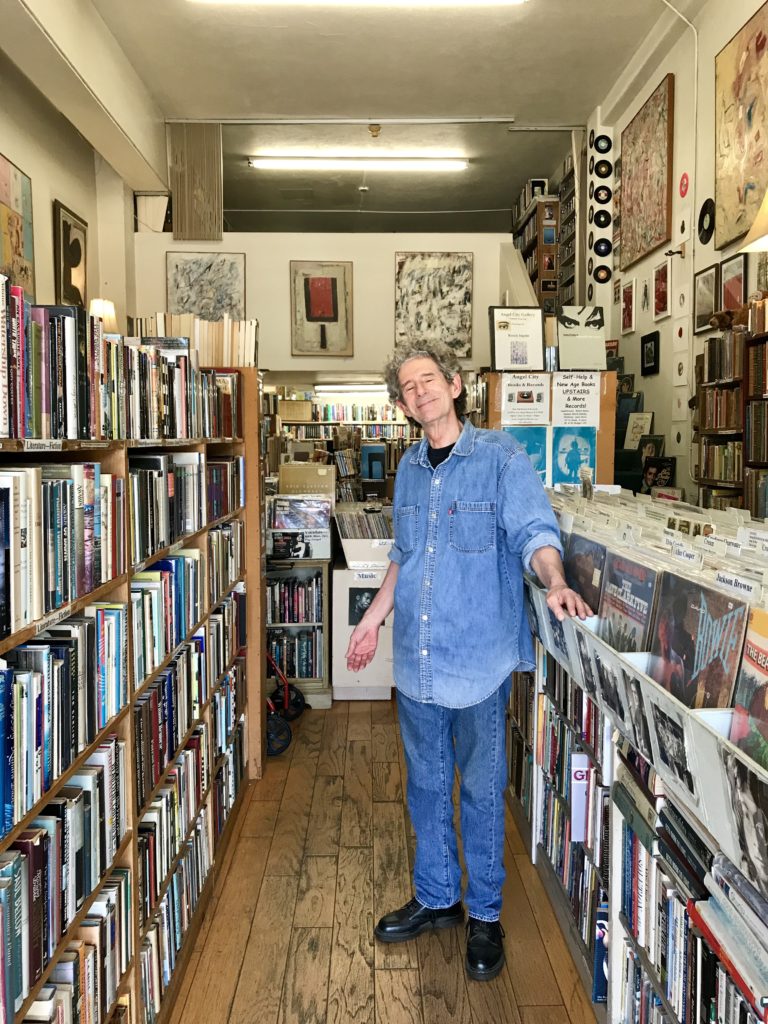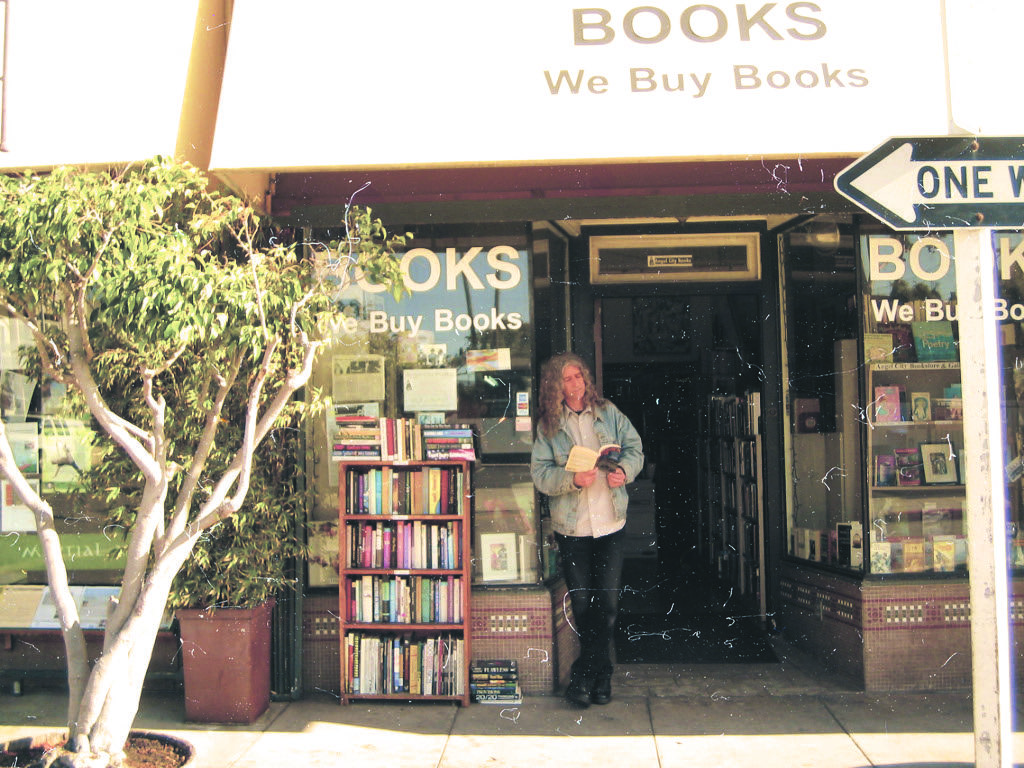If you want to understand the ceaseless gentrification of Santa Monica, just walk down Main Street.
The friendly coexistence of local-run businesses and more moneyed establishments catering to tourists (and the north-of-Montana crowd) is no more. The tourists have become permanent residents: tech bros and yoga moms parking their electric scooters in the middle of the sidewalk while they wait in line for their organic cold brew.
Main Street’s once-famous surf shop, which was part of the Dogtown and Z-Boys lineage, is the coffee shop serving cold brew. The other surf/skate shop, ZJ’s Boarding House, is a corporate-partnered shell of its former self. It’s a miracle that the liquor stores haven’t (yet) been replaced by artisan cheese and wine shops. However, if you head south and turn left on Pier Ave., you will find Angel City Books and Records — a vestige of Santa Monica’s quickly eroding past, a respite from what has woefully been rebranded as Silicon Beach.
Since opening at 218 Pier Ave. in August of 1998, Angel City has survived Amazon and bookstores of every size and tax bracket in Santa Monica and on the Westside.
Several factors account for its two decades at the end of that short block just off Main St. (e.g., a significant break on rent), but none overshadow Rocco Ingala. Co-founder and longtime sole owner/operator of Angel City, the 65-year-old L.A. native stocks and arranges used books and records seven days a week in his customary suit of head-to-toe denim.
Today, despite physical and economic adversity, he perseveres. “Preserving these books and this music is a responsibility,” Ingala says from his desk chair behind the store counter. He speaks not with self-righteousness but a passion tempered by apprehension. “If it all goes away, I think we’re hurt as a society.”

It’s a warm Sunday afternoon in late August. Ingala’s small desk fan whirs as songs by blues guitarist Robben Ford play from the store speakers. Several customers browse during our interview, and Ingala greets each with an enthusiastic but soft-spoken, “Hi, folks. Let me know if you need any help.” Only one of them makes a purchase. When all customers have gone, Ingala slowly rises to rectify any disarray.
“Some people are more respectful [of the store], and some people have very little respect. You wonder what their place looks like,” he jokes. “If it bothered me, though, I wouldn’t be in this business.”
Since 2014, however, tidying up has been physically taxing. That year, upon returning home from a routine hernia operation, Ingala suffered a sudden cardiac arrest and was pronounced dead for nearly an hour.
Among the 10 percent of cardiac arrest survivors, most suffer impaired consciousness and cognitive deficits. Yet Ingala is completely lucid, able to recount the addresses of long-shuttered book stores all over L.A. and the particulars of his childhood.
Still, he didn’t escape death unscathed. The weakness in his legs and his impaired flexibility force him to use a walker; he’s cut his once shoulder-length, wizard-like mane of grey to a manageable mop of curls. Sadly, Ingala’s also lost some of his independence. He relies on friends for grocery shopping and transportation to doctor appointments. He’s also no longer able to drive around the city scouring thrift stores for used books. For this endeavor, better known as book scouting, he relies on another friend. Fortunately, because Ingala lives in the brick-walled apartments above Angel City, he gets to and from the store without aid. It remains his domain.
For fans of literary fiction, the narrow confines of Angel City house a goldmine. Postmodernism, modernism, the Beats, existentialism, realism, naturalism—seemingly every era of the canon is represented by major and minor authors alike on the store’s nearly overflowing shelves. Inside the wire racks on the front desk are rare pocket paperbacks of books like Budd Schulberg’s acerbic Hollywood novel “What Makes Sammy Run?” and Fitzgerald’s Tender is the Night protected in plastic sleeves.
In the glass case behind the front desk, there are first, signed, and rare editions of novels by everyone from Ernest Hemingway and John Steinbeck to Aldous Huxley and Kurt Vonnegut.
“I’m waving a banner. This is literature here. And I’m willing to make sacrifices, even if I’m going to make less money because I don’t sell all of the trendy vampire books,” Ingala says of his curation.
“I don’t like that other stuff. I have no passion for it.” Though literary fiction is Angel City’s pièce de résistance, there are deep reserves of books from other genres and mediums. Shelves of poetry and plays are perpendicular to a long wall of crime/noir fiction. There are separate sections devoted to Santa Monica, Venice, California and U.S. history, and Ingala’s allotted ample shelf space to art, photography, and philosophy.
Since 2010, Ingala has filled record crates with an enviable collection that consists primarily of rock, blues and jazz, three genres he knows intimately and plays at home on his guitar. “[Records] saved the store. Eight years ago, business was so bad that I needed something to bring in extra money. I tried selling cards and incense. None of that worked, and it was boring,” he says. “The books and the records are a good combination.”
In some places online, Angel City is still listed as “Angel City Bookstore & Gallery.” The gallery consists of Ingala’s abstract expressionist paintings, which adorn most of the walls. While he’s sold several paintings and countless books and records, and while Angel City is ultimately a business, it feels more like a museum than a bookstore — a retrospective of Ingala’s life’s work.

Born in Montebello, California in 1953, Ingala grew up in La Mirada, the grandson of Italian immigrants, the son of two loving, albeit strict parents, and the brother of two sisters. Though he fondly remembers his mother reading to him as a child, he didn’t develop a love of reading until he discovered Kurt Vonnegut’s Cat’s Cradle in his teens. Coming of age in the late ’60s and early ’70s, he was equally infatuated with bands like Led Zeppelin and The Doors.
After high school, he worked sparingly and played in numerous bands with the hope of landing a record deal. When rock stardom didn’t arrive, he focused on one artistic endeavor at a time, immersing himself in writing, painting, or music before jettisoning one for the other.
No matter what Ingala pursued, books remained the one constant, his undying love. He read religiously and supported himself by working in bookstore and libraries. For several years, he also edited and published his own literary journal, Insomnia. Until he opened Angel City, however, he only worked long enough to fund his next project. “This is the record,” he said. “Prior to this, I would never last a year or two [at a job].”
Opened with the help of co-founder Steve Rodriguez, Angel City survived the first years thanks to Ingala’s digital prescience. In 1998, long before Amazon was the default destination for online book sales, he sold books via Angel City’s website. “Online was 90 percent of the income until 9/11…Then the economy got bad, and it was really hard,” Ingala said. “I almost lost the store a couple of times.”
Over the last two decades, the combination of Amazon’s ascendance, the Great Recession and rising rents have forced the majority of Angel City’s peers in Santa Monica and on the Westside, both independent and not, to close or relocate.
Midnight Special, which began operating in Santa Monica in the ‘70s, closed in 2003 due to increased rent on the Third Street Promenade. Kulturas Books, which moved in across the street from the ever-bustling Bob’s Market on Ocean Park in 2007, left the area in 2009. Borders, which was also on the Promenade, closed in 2009. Westwood’s Mystery Bookstore closed in 2011.
That same year, after over 15 years of business, Barnes & Noble closed its Westside Pavillion location. Alias Books in West L.A., which opened in 1959, closed in 2017, the victim of new property owners who aim to build condos. Hennessey + Ingalls, which specializes in books about art and architecture, relocated from Santa Monica to downtown in 2015. In 2017, Sideshow Books, which was just around the corner from Alias, relocated to a larger space in Faircrest Heights. In January of 2018, after more than 20 years, Barnes & Noble closed its three-story location on the Promenade.
Unlike many of the stores above, Angel City has had the great fortune of retaining the same rent since it opened. “The landlord is really good. He’s happy to have a store that contributes to the community,” Ingala says. The demise and relocation of each Westside bookstore brings in new customers, but sales haven’t skyrocketed. Angel City, which is to say Ingala, is still in debt. As his age increases and his health wanes, he also hopes to find a benefactor or someone to take over, “someone who would keep the spirit of the literature and not sell out too much.”
While he searches for his patron and/or successor, Ingala must also contend with new competition. Book Monster, which began as a chain of used bookstores in Korea, opened on the Promenade in 2017. Perhaps more concerning, Amazon opened a bookstore at Century City and plans to open another in the Pacific Palisades. Angel City has survived their online presence, but there’s no way of knowing how or if Amazon’s physical expansion will impact business.
There’s something profoundly and uniquely sad about the loss of a bookstore. Even in their most grotesque, capitalist iterations, bookstores house our attempts to communicate the deepest and most ineffable aspects of our humanity. At an independent bookstore, the possibility for a connection outside of the page, with the person behind the desk, will always feel far greater. For now, Angel City and Ingala represent the last hope for that book-bound intimacy on the Westside.
“Your books, your music—they define you,” Ingala says. “You can get carried away with it, but it’s an important part of our human existence.”